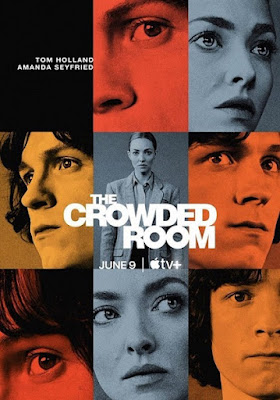October 7th might be the most evil date in the calendar. Obviously, it has become infamous for the Hamas’s horrific 2023 terror attacks. Furthermore, in 2006, independent Russian journalist Anna Politkovskaya was ruthlessly gunned down, in a blatantly politically motivated assassination, on October 7th—a date possibly selected as a “birthday gift” for Putin, who was indeed born on that very date. It was a tragedy, an outrage, and a precursor of worse atrocities to come. Politskaya’s idea of journalism was telling the truth, without fear or favor. Not surprisingly, that incurred the Putin regime’s wrath, as viewers witness in James Strong’s biographical drama, Words of War, which opens today in New York.
Politkovskaya wrote for Novaya Gazeta, Russia’s only editorially independent newspaper, edited by Dmitry Muratov, a co-recipient of the Nobel Peace Prize in 2021. Muratov is a muckraker at heart, but even he worries about the risks Politkovskaya takes. Frequently reporting from the battlefields of Russia’s dirty war in Chechnya, she earns the Chechens’ trust revealing Russian war crimes. She also earns Russian military’s hostility and several beatings.
Her family is not necessarily thrilled with her new notoriety, especially her son Ilya. Her semi-estranged husband Alexander somewhat resents seeing her journalistic prestige eclipsing his own. Yet, he makes a point of recording the death threats she receives, which becomes almost a full-time job. Thanks to the credibility she established, the Chechen militia hostage-takers requested her as a mediator during the Moscow Theater Siege, so she saw first-hand how the Russian police killed 132 innocent civilians through their use of an opioid-derived chemical agent.
The film begins with the first attempt on Politkovskaya’s life, an airliner poisoning that eerily parallels the 2020 attempted assassination of Alexei Navalny, and then rewinds to show the why’s and how’s. Frankly, it really starts with a bang, because her escape from the compromised hospital, engineered by Muratov and her grown children, Ilya and Vera, is a true white-knuckle sequence.
It is also worth noting Words of War never indulges in hagiography. As portrayed by the aptly cast Maxine Peake, Politkovskaya is often difficult, but always acutely human. She is also more right than wrong, at least on the big-picture issues.
If you don’t know how it ends, then the Kremlin would like to commend you on your choice of news sources. For the rest of us who understand what is coming, it still lands as a gut-punch, because it is so cold and cruel. We can’t say we weren’t warned. What happened to Politkovskaya happened to Navalny and the war crimes committed in Chechnya were repeated in Ukraine.















